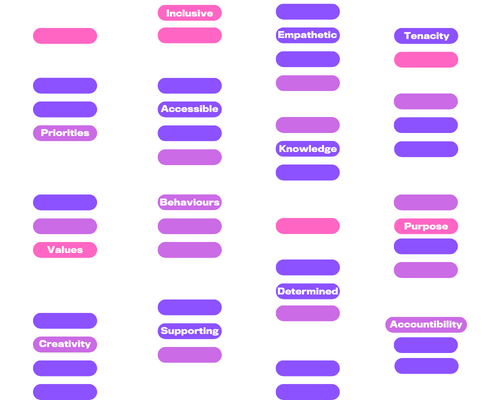Creativity
Creativity in business refers to the ability to generate or recognise ideas, alternatives, or possibilities that may be beneficial in solving problems, communicating with others, and entertaining ourselves and others. It involves thinking outside of the box and bringing unique, innovative solutions to the table.
In a business context, creativity can manifest in various ways, such as product innovation, novel marketing strategies, organisational structures, business models, or any other aspect of business operations where fresh and distinctive ideas can add value.
Inclusive
Inclusivity in business refers to the practice of ensuring that everyone within an organisation, regardless of their background, identity or circumstances, feels valued, respected and supported. This includes individuals of all races, genders, ages, religions, disabilities, and sexual orientations, among others.
An inclusive business environment fosters diversity by recognising and appreciating the unique experiences and perspectives each individual brings to the table. Inclusion is not only about fair and equal treatment, but also about creating a work culture where differences are genuinely valued and all employees have equal opportunities to succeed.
Accessible Service
Accessible service in a business refers to the provision of services, products, and facilities in such a manner that all people, including those with disabilities, can use them effectively. It’s about ensuring that no customer or potential customer encounters any form of barrier when trying to access a service or product.
Accessibility in business can be physical, such as ensuring brick-and-mortar stores are wheelchair accessible with ramps, wide aisles, and accessible restrooms. It can also be digital, such as ensuring websites, apps, and digital content are designed and developed in a way that people with a range of hearing, movement, sight, and cognitive abilities can use them.
An accessible service ensures fairness, inclusivity, and equal opportunities for everyone. This not only broadens a company’s customer base but also enhances its corporate reputation and social responsibility. Moreover, it’s not just a good business practice, but it’s also a legal requirement in many jurisdictions to prevent discrimination against people with disabilities.

